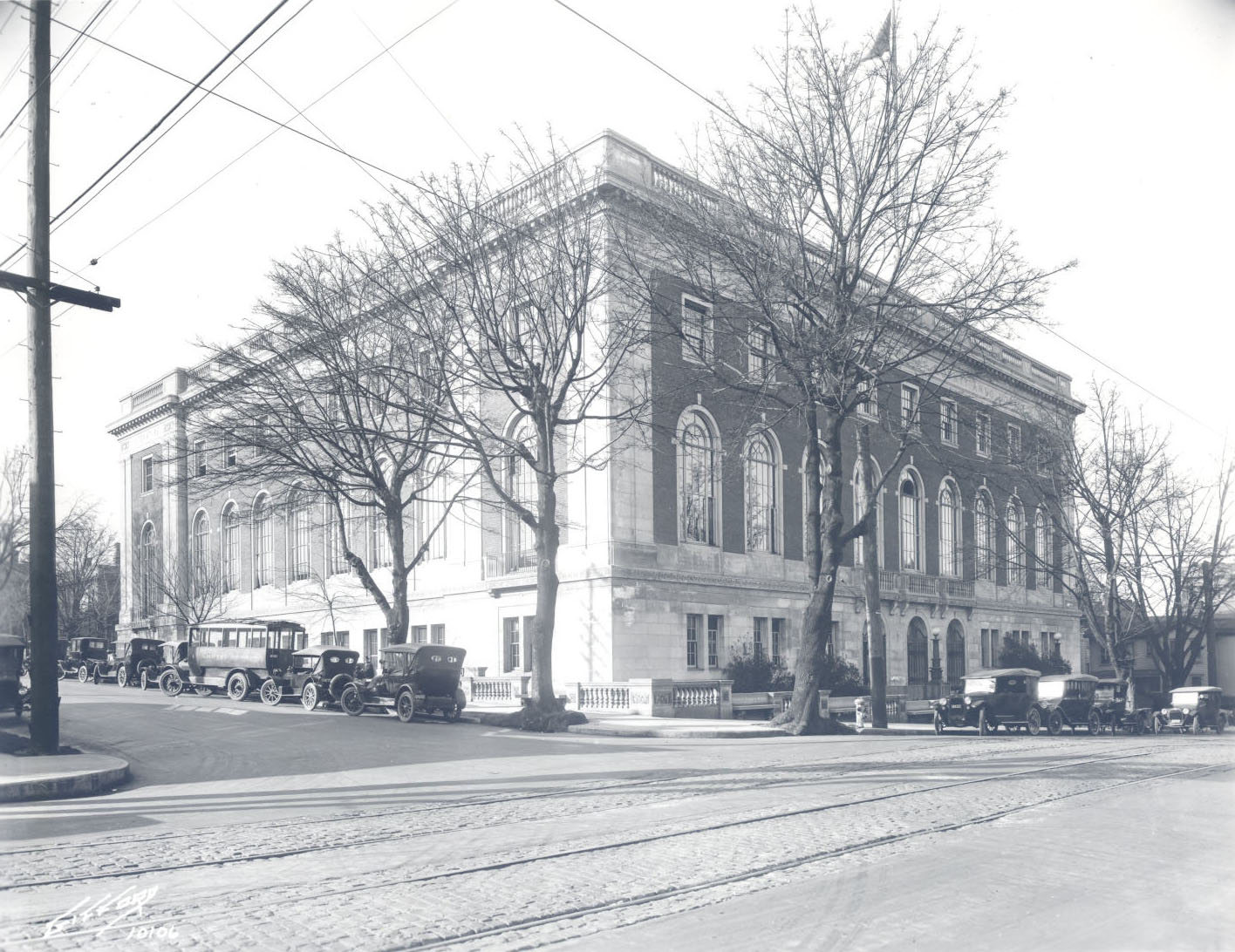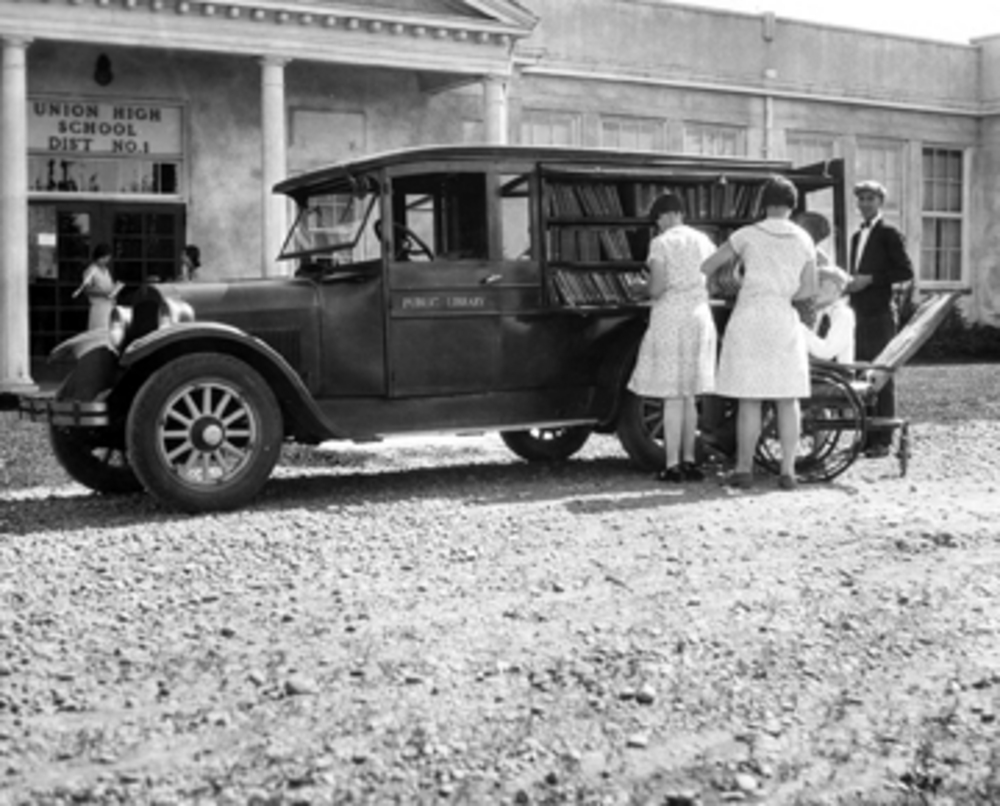Of the 1,679 public library buildings funded in the United States by Andrew Carnegie between 1883 and 1929, 31 were in Oregon. As was true in most states, the possibility of obtaining a Carnegie library grant spurred the development of public libraries in Oregon in the first two decades of the twentieth century.
Andrew Carnegie (1835-1919) was a Scottish-American industrialist who famously devoted the last third of his life to giving away the bulk of his fortune, one of the greatest in the United States at that time. As a boy growing up in a working-class immigrant family in Allegheny (now part of Pittsburg), Pennsylvania, he was able to use a small library established by Col. James Anderson for workers in the poor, industrial community. Carnegie later said of the experience: "I resolved if ever wealth came to me, that it should be used to establish free libraries, that other poor boys might receive opportunities for which we are indebted to that noble man.”
In order to obtain a grant for a Carnegie library, a community had to meet certain conditions. It had to demonstrate the need for a library, provide a site, and, most importantly, create a “maintenance fund” to operate the library that was at least equal to 10 percent of the building cost. In order to come up with a maintenance fund, most communities had to establish a tax-supported library, many for the first time.
This was the case in Oregon at the turn of the twentieth century, where there were no tax-supported public libraries. An attempt, led by women’s clubs, to pass public library enabling legislation failed in 1899. Supporters of the effort returned to the legislature in 1901, when they were successful in passing a law that made it possible for cities in Oregon to appoint a library board and to levy a property tax to support a public library. The City of Portland became the first to do so in 1901.
The 1901 law motivated many Oregon communities to consider establishing a public library that would qualify for a Carnegie grant. Several larger communities already had private subscription libraries or informal collections of books that had been made available to the public by women’s clubs.
The first Carnegie library grant in Oregon was made to the City of Eugene, at the instigation of a women’s club called The Fortnightly Club. The Eugene Public Library was established as a tax-supported library in 1904. A Carnegie grant was made soon after, and the first Carnegie library in Oregon opened in Eugene in August 1906. By 1910, Carnegie had made grants to Ashland, Baker City, Salem, and The Dalles.
The Multnomah County Library, the first public library in Oregon, used Carnegie grants to spur branch library development. The library received two grants in 1911 and 1912, totaling $165,000, which were used to fund seven branch libraries, including those in St. Johns and North Portland that are still in use today.
In addition to the grants made to the Multnomah County Library, from 1910 to 1920 grants were made to Albany, Dallas, Enterprise, Grants Pass, Hermiston, Hillsboro, Hood River, Klamath Falls, La Grande, McMinnville, Marshfield (Coos Bay), Medford, Milton-Freewater, Newberg, Ontario, Oregon City, Pendleton, Union, and Woodburn. In addition to funding these public libraries, Carnegie also made a grant to Pacific University in Forest Grove to fund a library building that was completed in 1912.
The Grants Pass Public Library, completed in 1921, was the last Carnegie library built in Oregon. In all, Carnegie provided $478,000 to build public libraries in Oregon, the equivalent of about $6.3 million in 2018 dollars. On a per capita basis, Oregon received about $50 per 100 residents, placing Oregon in the top ten states to benefit from Carnegie’s library philanthropy. Oregon also has the distinction of being one of only two states in which every community offered a Carnegie library grant was able to follow through on their commitments to provide a site and maintenance fund, and build a new library.
Only eleven of the thirty-one Carnegie libraries built in Oregon are still being used as public libraries. Several have been torn down, and many are being used for other community purposes. In addition to two Multnomah County Library branches, the Carnegie libraries still in use are in Albany, Ashland, Enterprise, Hood River, McMinnville, Newberg, Oregon City, Union, and Woodburn. Most have had extensive renovations and additions. The Carnegie libraries in Albany (now a branch library), Enterprise, and Union have had the least alteration.
Without the incentive of Andrew Carnegie’s building grants, the establishment of public libraries in Oregon would have taken longer and Oregon might not have achieved the quality of public library service in most communities that Oregonians enjoy today.
-
![]()
Carnegie Library, The Dalles, 1978.
Courtesy Building Oregon, University of Oregon. "Carnegie Library (The Dalles, Oregon)" Oregon Digital -
![Carnegie Library, Coos Bay (1914)]()
Carnegie Library, Coos Bay (1914).
Carnegie Library, Coos Bay (1914) Courtesy UO Libraries, pna_01040
-
![Carnegie Library, Medford (1912)]()
Carnegie Library, Medford (1912).
Carnegie Library, Medford (1912) Courtesy UO Libraries, pna_02776
-
![Carnegie Library, Gresham, 2008]()
Carnegie Library, Gresham, 2008.
Carnegie Library, Gresham, 2008 Courtesy UO Libraries, pna_20603
-
![Carnegie Library, Hood River]()
Carnegie Library, Hood River.
Carnegie Library, Hood River Courtesy UO Libraries, pna_02275
-
![Carnegie Library, Baker City]()
Carnegie Library, Baker City.
Carnegie Library, Baker City Courtesy Baker County Library
-
![The state's first Carnegie library]()
Eugene Public Library, 1935.
The state's first Carnegie library Courtesy Oreg. Hist. Soc. Research Library, 010369
-
![]()
Union Carnegie Library, September 2023.
Courtesy Tania Hyatt-Evenson
-
![]()
Union Carnegie Library, September 2023.
Courtesy Tania Hyatt-Evenson
Related Entries
-
![Central Library (Multnomah County Library)]()
Central Library (Multnomah County Library)
Central Library, the largest building in the Multnomah County Library s…
-
![Library Association of Portland]()
Library Association of Portland
The first public library in Oregon, supported by taxes and freely avail…
-
![Oregon Territorial Library]()
Oregon Territorial Library
The Oregon Territorial Library was the first publicly funded library in…
Related Historical Records
Map This on the Oregon History WayFinder
The Oregon History Wayfinder is an interactive map that identifies significant places, people, and events in Oregon history.
Further Reading
"A Few Books Began the Library." Pacific: The Magazine of Pacific University 38.3&4 (2005).
Bobinski, George S. Carnegie Libraries: Their History and Impact on American Public Library Development. Chicago, IL: American Library Association, 1969.
Koch, Theodore W. A Book of Carnegie Libraries. White Plains, NY: H. W. Wilson Company, 1917.















